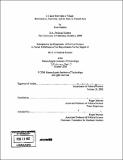It takes more than a village : mobilization, networks, and the state in Central Asia
Author(s)
Radnitz, Scott (Scott B.)
DownloadFull printable version (19.07Mb)
Other Contributors
Massachusetts Institute of Technology. Dept. of Political Science.
Advisor
Roger Peterson.
Terms of use
Metadata
Show full item recordAbstract
This dissertation develops and demonstrates a theory to account for the outbreak of mass mobilization in authoritarian settings. Two conditions make the expansion of protest across community boundaries more likely: (1) low levels of public goods, coupled with (2) economic opportunities that allow elites autonomous from the state to earn revenue. Under regimes where the rule of law is weak, non-state elites have an incentive to protect their assets from state predation by developing a social support base. They do this by making symbolic gestures and providing surrogate public goods to communities. If the regime threatens to harm this relationship, by restricting elites' freedoms or denying them access to resources, top-down mobilization is one of the few means available to advance or defend their position. Elites base their appeal on shared local identity and the material benefit that people derive from elite charity. The ultimate scale of mobilization is determined by the number and geographic dispersion of elites who mobilize locally and then unite their protests. (cont.) Three mechanisms may be activated to expand mobilization beyond the local level: demonstration, in which people receive information of an event through an impersonal medium and emulate other people's actions by analogy to their own situation; diffusion, or direct contact between actors connected by strong social ties; and brokerage, or mediation between groups by a small number of well-connected individuals. I argue that only if diffusion and brokerage are activated in concert can an incipient movement overcome gaps between (1) elites and masses and (2) different communities (or regions). I demonstrate my theory by comparing Kyrgyzstan and Uzbekistan, then analyzing two cases of mass mobilization within Kyrgyzstan-one of regional scale and one national. In both cases, I illustrate the centrality of vertical networks in bringing about mobilization, and trace how both brokerage and diffusion were activated to expand mobilization from local to regional or national scale. I then test the theory on cases outside the region. The dissertation contributes to the comparative politics literature on contentious politics, the breakdown of authoritarian regimes, and the effect of Soviet legacies on state and society.
Description
Thesis (Ph. D.)--Massachusetts Institute of Technology, Dept. of Political Science, February 2007. Includes bibliographical references (p. [234]-[252]).
Date issued
2007Department
Massachusetts Institute of Technology. Department of Political SciencePublisher
Massachusetts Institute of Technology
Keywords
Political Science.